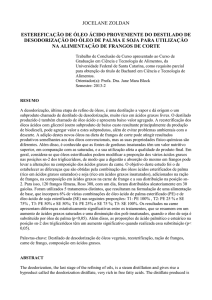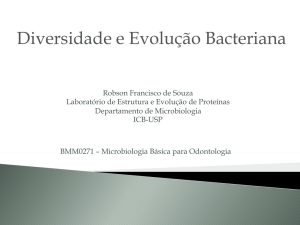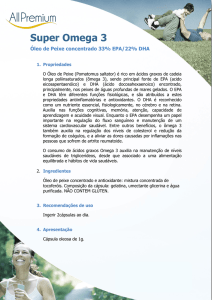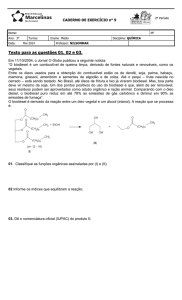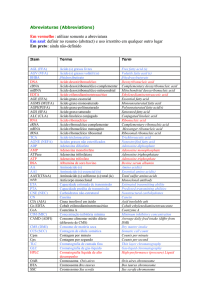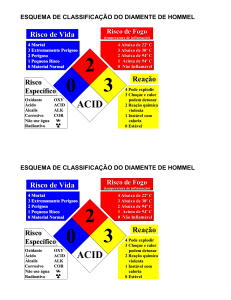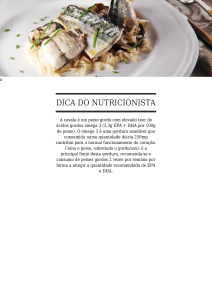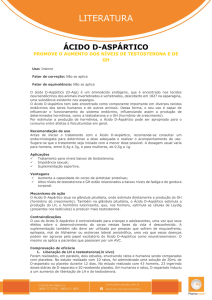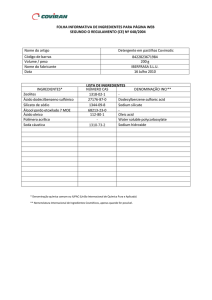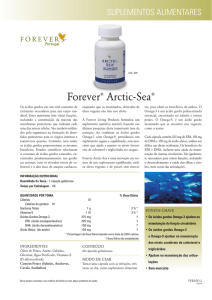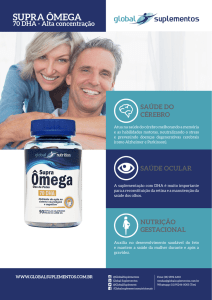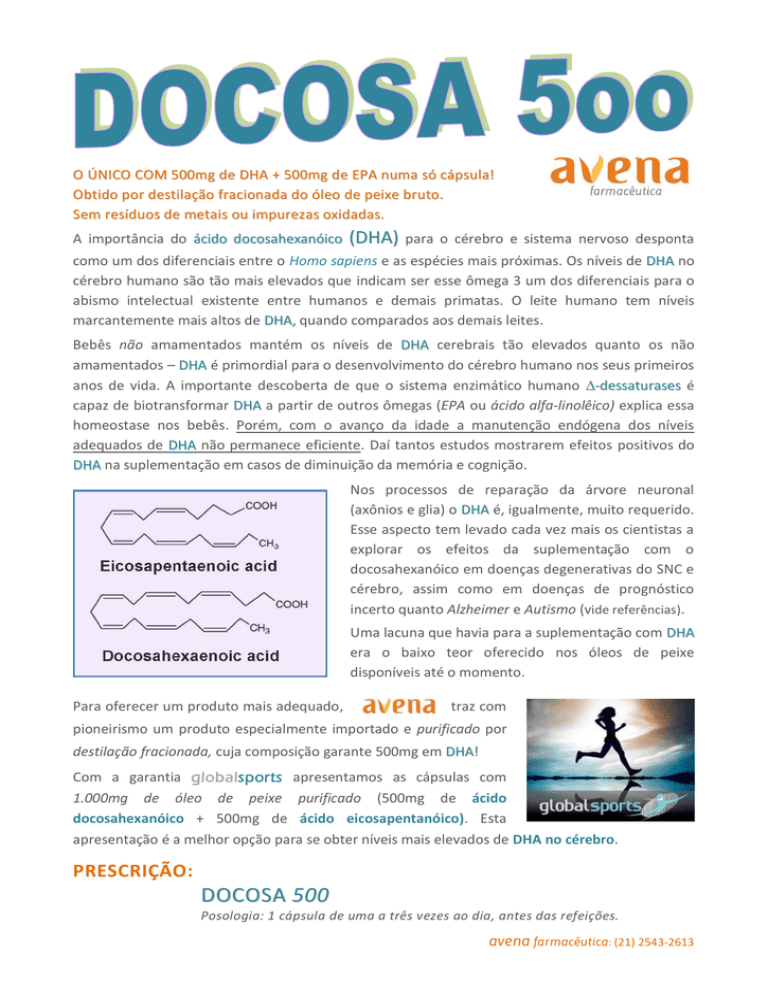
O Ú N I CO C O M 5 0 0 m g d e D H A + 5 0 0 m g d e E P A n u m a s ó c á p s u l a !
Obtido por destilação fracionada do óleo de peixe bruto.
S e m r e s í d u o s d e me t a i s o u i m p u r e z a s o x i d a d a s .
A importância do ácido docosahexanóico
(DHA) para
o cérebro e sistema nervoso desponta
como um dos diferenciais entre o Homo sapiens e as espécies mais próximas. Os níveis de DHA no
cérebro humano são tão mais elevados que indicam ser esse ômega 3 um dos diferenciais para o
abismo intelectual existente entre humanos e demais primatas. O leite humano tem níveis
marcantemente mais altos de DHA, quando comparados aos demais leites.
Bebês não amamentados mantém os níveis de DHA cerebrais tão elevados quanto os não
amamentados – DHA é primordial para o desenvolvimento do cérebro humano nos seus primeiros
anos de vida. A importante descoberta de que o sistema enzimático humano -dessaturases é
capaz de biotransformar DHA a partir de outros ômegas (EPA ou ácido alfa-linolêico) explica essa
homeostase nos bebês. Porém, com o avanço da idade a manutenção endógena dos níveis
adequados de DHA não permanece eficiente. Daí tantos estudos mostrarem efeitos positivos do
DHA na suplementação em casos de diminuição da memória e cognição.
Nos processos de reparação da árvore neuronal
(axônios e glia) o DHA é, igualmente, muito requerido.
Esse aspecto tem levado cada vez mais os cientistas a
explorar os efeitos da suplementação com o
docosahexanóico em doenças degenerativas do SNC e
cérebro, assim como em doenças de prognóstico
incerto quanto Alzheimer e Autismo (vide referências).
Uma lacuna que havia para a suplementação com DHA
era o baixo teor oferecido nos óleos de peixe
disponíveis até o momento.
Para oferecer um produto mais adequado,
traz com
pioneirismo um produto especialmente importado e purificado por
destilação fracionada, cuja composição garante 500mg em DHA!
Com a garantia globalsports apresentamos as cápsulas com
1.000mg de óleo de peixe purificado (500mg de ácido
docosahexanóico + 500mg de ácido eicosapentanóico). Esta
apresentação é a melhor opção para se obter níveis mais elevados de DHA no cérebro.
PRESCRIÇÃO:
DOC OSA 500
Posologia: 1 cápsula de uma a três vezes ao dia, antes das refeições.
avena farmacêutica: (21) 2543-2613
Referências:
1.
2.
3.
4.
5.
6.
7.
8.
9.
10.
11.
12.
13.
14.
15.
16.
17.
18.
19.
20.
21.
22.
23.
24.
25.
26.
27.
28.
29.
Omega-3 polyunsaturated fatty acid (EPA, DHA) status in major depressive disorder with comorbid anxiety disorders. Liu
JJ & cols. J Clin Psychiatry, 2013 Jul; 74(7):732-738.
Omega-3 fatty acid supplementation in adolescents with borderline personality disorder and ultra-high risk criteria for
psychosis: a post hoc subgroup analysis of a double-blind, randomized controlled trial. Amminger GP & cols. Can J
Psychiatry, 2013 Jul; 58(7):402-408.
Effect of omega-3 and ascorbic acid on inflammation markers in depressed shift workers in Shahid Tondgoyan Oil
Refinery, Iran: a randomized double-blind placebo-controlled study. Khajehnasiri F, Mortazavi SB, Allameh A,
Akhondzadeh S. J Clin Biochem Nutr, 2013 Jul; 53(1):36-40.
Perinatal supplementation with omega-3 polyunsaturated Fatty acids improves sevoflurane-induced neurodegeneration
and memory impairment in neonatal rats. Lei X & cols. PLoS One. 2013 Aug 13; 8(8).
n-3 fatty acids (eicosapentanoic and docosahexanoic acids) in epilepsy and for the prevention of sudden unexpected
death in epilepsy. DeGiorgio CM, Miller P. Epilepsy Behav. 2008 Nov; 13(4):712-713.
Efficacy of omega-3 fatty acid supplementation on improvement of bipolar symptoms: a systematic review. Turnbull T,
Cullen-Drill M, Smaldone A. Arch Psychiatr Nurs. 2008 Oct; 22(5):305-311.
Omega-3 fatty acids: potential role in the management of early Alzheimer's disease. Jicha GA, Markesbery WR. Clin Interv
Aging, 2010 Apr; 5:45-61.
Control of Fatty Acid Intake and the Role of Essential Fatty Acids in Cognitive Function and Neurological Disorders.
Panickar KS, Bhathena SJ. In: Montmayeur JP, le Coutre J, editors. Fat Detection: Taste, Texture, and Post Ingestive Effects.
Boca Raton (FL): CRC Press; 2010, Chapter 18.
Omega-6 and omega-3 fatty acids predict accelerated decline of peripheral nerve function in older persons. Lauretani F &
cols. Eur J Neurol. 2007 Jul; 14(7):801-8. Erratum in: Eur J Neurol. 2007 Sep;14(9):1071.
The effects of maternal dietary docosahexaenoic acid intake on rat pup myelin and the auditory startle response.
Haubner L & cols. J. Dev Neurosci, 2007; 29(6):460-467.
The effect of supplementation with n-3 fatty acids on the physical performance in subjects with spinal cord injury. Javierre
C & cols. J Physiol Biochem, 2006 Dec; 62(4):271-279.
Omega-3 supplementation lowers inflammation and anxiety in medical students: a randomized controlled trial. KiecoltGlaser JK & cols. Brain Behav Immun. 2011 Nov; 25(8):1725-1734.
Identification and characterization of new Δ-17 fatty acid desaturases. Xue Z & cols. Appl Microbiol Biotechnol, 2013 Mar;
97(5):1973-1985.
Effects of Eicosapentanoic Acid and Docosahexanoic Acid on Mortality Across Diverse Settings: Systematic Review and
Meta-Analysis of Randomized Trials and Prospective Cohorts: Nutr Research Series, Vol. 4. Trikalinos TA, Lee J, Moorthy D,
Yu WW, Lau J, Lichtenstein AH, Chung M. Rockville (MD): Agency for Healthcare Research and Quality (US); 2012 Feb.
Lower serum paraoxonase-1 activity is related to linoleic and docosahexanoic fatty acids in type 2 diabetic patients. RasicMilutinovic Z & cols. Arch Med Res. 2012 Jan; 43(1):75-82.
Fish oil supplementation improved liver phospholipids fatty acid composition and parameters of oxidative stress in male
Wistar rats. Popović T & cols. J Anim Physiol Anim Nutr (Berl), 2012 Dec; 96(6):1020-1029.
Docosahexanoic acid-induced coronary arterial dilation: actions of 17S-hydroxy docosahexanoic acid on K+ channel
activity. Li X, Hong S, Li PL, Zhang Y. J Pharmacol Exp Ther. 2011 Mar; 336(3):891-899.
Fatty acid signal, neurogenesis, and psychiatric disorders. Osumi N. Nihon Shinkei Seishin Yakurigaku Zasshi. 2010 Jun;
30(3):141-148.
Enhanced generation of megakaryocytes from umbilical cord blood-derived CD34(+) cells expanded in the presence of
two nutraceuticals, docosahexanoic acid and arachidonic acid, as supplements to the cytokine- containing medium.
Siddiqui NF, Shabrani NC, Kale VP, Limaye LS. Cytotherapy, 2011 Jan; 13(1):114-128.
Beneficial effect of docosahexanoic acid and lutein on retinal structural, metabolic, and functional abnormalities in
diabetic rats. Arnal E & cols. Curr Eye Res, 2009 Nov; 34(11):928-938.
A role for omega-3 polyunsaturated fatty acid supplements in diabetic neuropathy. Yee P, Weymouth AE, Fletcher EL,
Vingrys AJ. Invest Ophthalmol Vis Sci, 2010 Mar; 51(3):1755-1764.
Anti-inflammatory effects of EPA and DHA are dependent upon time and dose-response elements associated with LPS
stimulation in THP-1-derived macrophages. Mullen A, Loscher CE, Roche HM. J Nutr Biochem, 2010 May; 21(5):444-450.
Effect of omega-3 fatty acids on cardiovascular risk factors in patients with type 2 diabetes mellitus and
hypertriglyceridemia: an open study. De Luis DA & cols. Eur Rev Med Pharmacol Sci, 2009; 13(1):51-55.
Chemopreventive and renal protective effects for docosahexaenoic acid (DHA): implications of CRP and lipid peroxides. ElMesery M & cols. Cell Div, 2009; 4:6.
The benefit of docosahexanoic acid on the migration of vascular smooth muscle cells is partially dependent on Notch
regulation of MMP-2/-9. Delbosc S & cols. Am J Pathol, 2008 May; 172(5):1430-1440.
Docosahexaenoic Acid, inflammation, and bacterial dysbiosis in relation to periodontal disease, inflammatory bowel
disease, and the metabolic syndrome. Tabbaa M, Golubic M, Roizen MF, Bernstein AM. Nutrients, 2013; 5(8):3299-3310.
Docosahexanoic acid improves chemotherapy efficacy by inducing CD95 translocation to lipid rafts in ER(-) breast cancer
cells. Ewaschuk JB, Newell M, Field CJ. Lipids, 2012 Nov; 47(11):1019-1030.
The binding of Aβ1-42 to lipid rafts of RBC is enhanced by dietary docosahexaenoic acid in rats: Implicates to Alzheimer's
disease. Hashimoto M, Hossain S, Katakura M, Al Mamun A, Shido O. Biochim Biophys Acta. 2015 Jun;1848(6):1402-9.
Inadequate supply of vitamins and DHA in the elderly: implications for brain aging and Alzheimer-type dementia.
Mohajeri MH, Troesch B, Weber P. Nutrition. 2015 Feb;31(2):261-75.
avena farmacêutica: (21) 2543-2613


